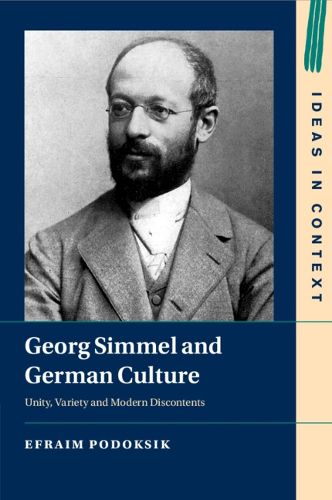Readings Newsletter
Become a Readings Member to make your shopping experience even easier.
Sign in or sign up for free!
You’re not far away from qualifying for FREE standard shipping within Australia
You’ve qualified for FREE standard shipping within Australia
The cart is loading…






The significance of the German philosopher and social thinker, Georg Simmel (1858-1918), is only now being recognised by intellectual historians. Through penetrating readings of Simmel's thought, taken as a series of reflections on the essence of modernity and modern civilisation, Efraim Podoksik places his ideas within the context of intellectual life in Germany, and especially Berlin, under the Kaiserreich. Modernity, characterised by the growing differentiation and fragmentation of culture and society, was a fundamental issue during Simmel's life, underpinning central intellectual debates in Imperial Germany. Simmel's thought is depicted here as an attempt at transforming the complexity of these debates into a coherent worldview that can serve as an effective guide to understanding their main parameters. Paying particular attention to the genealogy and usage of the concepts of Bildung, culture and civilisation in Germany, this study offers contextual analyses of Simmel's philosophies of culture, society, art, religion and the feminine, as well as his interpretations of Dante, Kant, Nietzsche, Schopenhauer, Goethe and Rembrandt.
$9.00 standard shipping within Australia
FREE standard shipping within Australia for orders over $100.00
Express & International shipping calculated at checkout
The significance of the German philosopher and social thinker, Georg Simmel (1858-1918), is only now being recognised by intellectual historians. Through penetrating readings of Simmel's thought, taken as a series of reflections on the essence of modernity and modern civilisation, Efraim Podoksik places his ideas within the context of intellectual life in Germany, and especially Berlin, under the Kaiserreich. Modernity, characterised by the growing differentiation and fragmentation of culture and society, was a fundamental issue during Simmel's life, underpinning central intellectual debates in Imperial Germany. Simmel's thought is depicted here as an attempt at transforming the complexity of these debates into a coherent worldview that can serve as an effective guide to understanding their main parameters. Paying particular attention to the genealogy and usage of the concepts of Bildung, culture and civilisation in Germany, this study offers contextual analyses of Simmel's philosophies of culture, society, art, religion and the feminine, as well as his interpretations of Dante, Kant, Nietzsche, Schopenhauer, Goethe and Rembrandt.